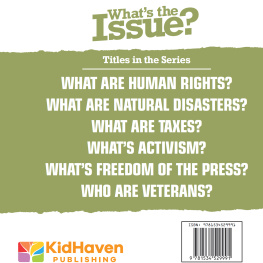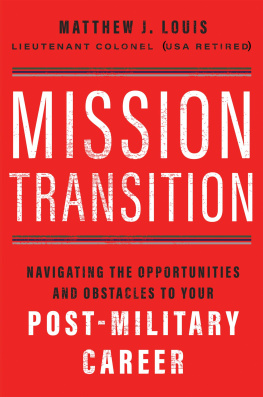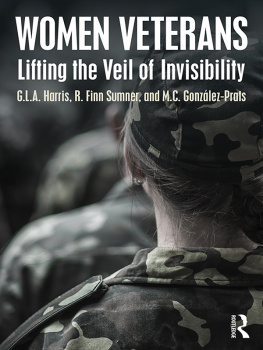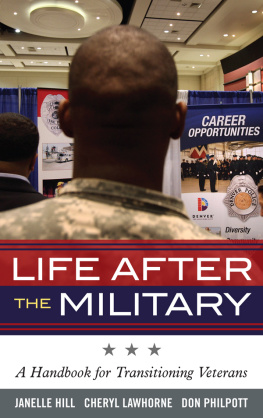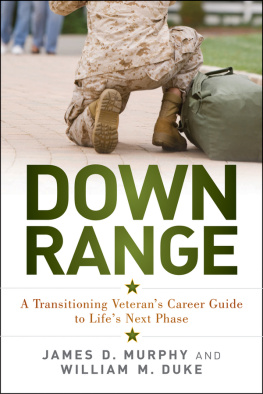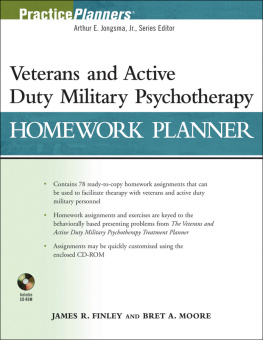The Civilian Lives of U.S. Veterans
The Civilian Lives of U.S. Veterans
Issues and Identities
VOLUME 1
Louis Hicks, Eugenia L. Weiss,
and Jose E. Coll, Editors
Foreword by Robert A. McDonald,
Secretary of the Department of Veterans Affairs

Copyright 2017 by ABC-CLIO, LLC
All rights reserved. No part of this publication may be reproduced, stored in a retrieval system, or transmitted, in any form or by any means, electronic, mechanical, photocopying, recording, or otherwise, except for the inclusion of brief quotations in a review, without prior permission in writing from the publisher.
Library of Congress Cataloging-in-Publication Data
Names: Hicks, Louis, author. | Weiss, Eugenia L., author. | Coll, Jose E., author.
Title: The civilian lives of U.S. veterans : issues and identities / Louis Hicks, Eugenia L. Weiss, and Jose E. Coll, editors ; foreword by Robert A. McDonald, Secretary of the Department of Veterans Affairs.
Description: Santa Barbara, California : Praeger, an imprint of ABC-CLIO, LLC, [2017] | Includes bibliographical references and index.
Identifiers: LCCN 2016017943 (print) | LCCN 2016018573 (ebook) | ISBN 9781440842788 (set : alk. paper) | ISBN 9781440846809 (volume 1 : alk. paper) | ISBN 9781440846816 (volume 2 : alk. paper) | ISBN 9781440842795 (ebook)
Subjects: LCSH: VeteransUnited States. | VeteransUnited StatesSocial conditions. | VeteransUnited StatesEmployment.
Classification: LCC UB357 .H524 2017 (print) | LCC UB357 (ebook) | DDC 305.9/06970973dc23
LC record available at https://lccn.loc.gov/2016017943
ISBN: 978-1-4408-4278-8 (set)
ISBN: 978-1-4408-4680-9 (vol. 1)
ISBN: 978-1-4408-4681-6 (vol. 2)
EISBN: 978-1-4408-4279-5 (set)
212019181712345
This book is also available as an eBook.
Praeger
An Imprint of ABC-CLIO, LLC
ABC-CLIO, LLC
130 Cremona Drive, P.O. Box 1911
Santa Barbara, California 93116-1911
www.abc-clio.com
This book is printed on acid-free paper 
Manufactured in the United States of America
This book is dedicated to the military veterans and their families who have proudly served our country with selfless dedication for the greater good of our nation. The editors would like to acknowledge and honor Dr. and Mrs. Somers, who lost their son, Daniel, an Iraq War veteran, to suicide, for their courage and inspiration in helping other veterans and their families through their nonprofit, Operation Engage America, in providing access to care and raising awareness about the needs of the veteran community.
Contents
Illustrations
Tables
Figures
Robert A. McDonald
The legacy of Veterans service to our nation and the freedoms they have guaranteed surround us: in public meeting places where we gather and speak openly on any subject; in the many places we gather to worship as we see fit; in the variety of the media we choose to read or watch, written and broadcast by those free to express opinions absent fear of reprisal; in the places we go to cast our votes for those we feel are worthy of governing our country.
We are able to do all of these things because those who wore our nations uniforms answered the call to service. Through the ebb and flow of history, in times of total war and periods of restless peace, their courage did not waiver; they delivered on the promises of our Constitution.
As we honor our 22 million living Veterans and remember their achievements, we should also consider the challenges and issues they face when they leave uniformed service and reenter American society as civilians. Just as their contributions are unique and enduring, so too are their challenges. Americans of every generation, whether having served in the military or not, have an obligation to understand, and to assist in easing, those challenges.
That obligation was best captured by President Abraham Lincoln in March 1865. As the devastation and killing of the Civil War drew to a close, he reminded the American public, in his second inaugural address, of our duty to care for those who shall have borne the battle and their families and survivors. It is from that promise that the Department of Veterans Affairs (VA) draws its inspiring mission. But the VA cannot do it alone.
The chapters in this book shed light on Veterans lives at work, at home with their families, in public and private organizations and in politics, in challenges to their physical and mental health, as others view them, and in the changing and evolving nature of their demographics in the 21st century.
I hope the broad array of perspectives in this book inspire all its readers to better understand the issues and challenges of our fellow Americans who have borne the battle.
This foreword is a work of the U.S. government and is not subject to copyright protection in the United States. Foreign copyrights may apply.
Preface
The editors would like to thank Jessica Gribble, acquisitions editor at Praeger, for her idea for this book, and for her patience, dedication, and wisdom. We are also grateful to the entire staff at Praeger and ABC-CLIO. They have been unfailingly responsive, thoughtful, and reasonable throughout what can sometimes be a trying process.
Numerous people at St. Marys College of Maryland helped bring the book along. Isabel Rickman, a senior majoring in sociology, read many of the chapters and improved the writing significantly. Jenna Witman, another sociology student, tracked down materials early on that helped develop the original outline. Lucy Myers and Sandy Robbins of Kent Hall helped produce the manuscript and kept track of the author database and other items. Veronica Arellano Douglas and Conrad Helms, along with the rest of the outstanding staff of the Colleges excellent library, quickly procured important materials. Professor Charles Holden helped place the voting of veterans into a historical context. Professors Iris Ford and Asif Dowla contributed nuggets of wisdom.
All three of the editors have come to this topic by related routes. One of us (Hicks) left the U.S. military in 1988 and promptly went to college and graduate school on the then-existing version of G.I. education benefits. In graduate school, he was a fish out of water; there were no other veterans in the program at all. While there, sociologists strongly suggested that the young-ish veteran study the military, because few people are doing that and you would have understanding and credibility. And so a direction was set that has continued to the present day with various works.
Outside of Marine Corps base Camp Pendleton, California, Weiss had the honor of serving military veterans and their families as a civilian social worker/psychologist in private practice for almost 18 years. When she began her work, there was little literature on how to successfully engage with and provide effective services for this population, and thus she has made it her lifes work and mission to become better educated, conduct research, and train future mental health professionals in the field of veterans studies.
As a Marine Corps veteran, Coll was a beneficiary of both Chapter 31 Vocational Rehabilitation and Employment (VR&E) and the Chapter 30 Montgomery GI Bill, which allowed him to earn a bachelors in social work, masters in social work, and PhD in counseling education. This experience has allowed him to develop a keen understanding of the challenges faced by student veterans. Moreover, Coll understands that although earning a degree is an individual act, the attainment and following the path require the support of many, such as professors like Dr. Exum, who has dedicated much of his academic career to exploring how to best serve Vietnam veterans suffering from PTSD; Dr. Beltran, the Korean War veteran, teacher, and mentor who never gave up on the young Coll and unknowingly has been a beacon of perseverance; and Colls family, Cary, Marcus, Dominik, Nicholas, and Sophia, who continue to charge and conquer any obstacle presented.
Next page
![Louis Hicks The Civilian Lives of U.S. Veterans: Issues and Identities [2 volumes]](/uploads/posts/book/133676/thumbs/louis-hicks-the-civilian-lives-of-u-s-veterans.jpg)
